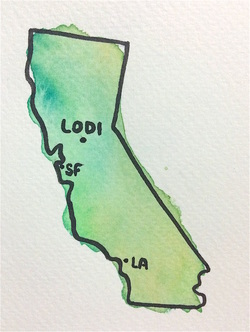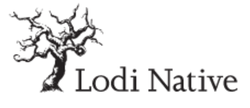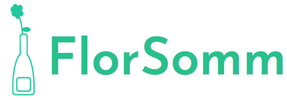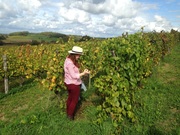 Where is Lodi, again? It's in northern California, just east of San Francisco. Image ©Floreana Edwards Where is Lodi, again? It's in northern California, just east of San Francisco. Image ©Floreana Edwards
Maybe I am late to the game, but native yeast fermentation is happening in Lodi.
Reluctantly perhaps, but it is happening. Lodi winemakers have recently started a new project called Lodi Native, which refers to fermentation using only native yeast. (Native yeast is naturally present on the skins of the grapes and will start the fermentation process without human intervention.) The alternative to native yeast fermentation is to inoculate the wine with a commercially-producted yeast strain. Commercial yeasts are very predictable, but tend to result in "cookie cutter" styled wines which taste very similar. As a comparision, think about the vast array of beer yeasts and how wildly different their styles taste. Wine works in just the same way. Lodi Native, therefore, is doing something pretty cool. Lodi Native Winemaking Rules
Here's how the Lodi Native website lays out the restrictions for making a Lodi Native wine.
Phew! That's a long list of tinkering and chemicals....to avoid. Oh, conventional winemaking....you are so heavy handed... Who is Making Natural Wine in Lodi? Lodi Native logo as it appears on the wine labels. From www.lodinative.com Lodi Native logo as it appears on the wine labels. From www.lodinative.com
It According to Layne Montgomery from M2 Winery, ( by the way, he is a riot and I highly recommend visiting him), this program was initially offered to thirty different wineries in Lodi and only six got on board with the program.
These six wineries are: M2, Fields Family, St. Amant, McCay Cellars, Macchia, and the Maley Brothers. This program is a just single bottling. One wine is made naturally and submitted to the program. It receives a special wine label. Therefore, all of a winemaker's wines are not going to be Lodi Native wines. It is considered a side project for most winemakers. The Lodi Native group disagrees on the merits of the program. The tasting room attendants at Fields Family and McKay Cellars thought that "the native yeast thing" is great. They claim to already make all of their wines using natural methods (allowing for native yeast fermentation to occur; no fining or filtering the wine...). Others are staunchly conventional and think that Lodi Native wines are a risky side project. (I was unable to meet any Maley Brothers people today.) The Start of Something Big?
What I find interesting is that Lodi, a region mainly known for big, manipulated wines, has creeped its way onto the natural bandwagon. Woohoo, right? Kudos to Lodi winemakers. As there are currently no regulations for natural wine production or natural wine labelling in California (other than Demeter Certification) could this be the groundwork for future natural winemaking restrictions? Is Lodi Native trying to emulate other natural wine groups such as In Pursuit of Balance, for example? Should we expect to see more groups like this popping up?
The wines I tasted today were balanced, restrained, and good, but I'll say they are still playing it "safe" and not totally allowing the natural winemaking process to shine (nothing off the wall or soulful about it yet). I believe that this is a good start, in any case. Almost all the past vintages are sold out. It is a new program and it includes winemakers who are reluctant to the idea of doing less. Some of the wineries seem pretty freaked out about giving up their tools, but they are participating in Lodi Native anyway. Until today, I'd never met a winemaker who makes natural wines without feeling personally driven to do it. When I was speaking with Layne Montgomery from M2 Winery, he laughingly admitted to me that he didn't use "new" oak on his wine, but he didn't use "old" oak either. And was his 2014 Lodi Native wine filtered? You bet. So, some rules are being bent. We shall see how this develops. In two weeks, the 2014 vintage will be released for reviews and public sale. That should be an indicator of how the program is developing and what it may have in store for the future.
1 Comment
Leave a Reply. |
AuthorMy name is Floreana and I'm a sommelier. I think that natural wine is the shit. I also think that sustainable farming might just save the world. Categories
All
Archives |


 RSS Feed
RSS Feed
